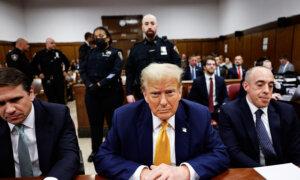A group of legal experts and former U.S. officials argued that Jack Smith has the authority to prosecute the former president.
Special counsel Jack Smith has the constitutional authority to prosecute former President Donald Trump in his classified records case, a group of legal analysts and former U.S. officials argued in a new court motion this week.
They added that Congress has the “vested authority in the Attorney General to appoint the Special Counsel as an inferior officer,” adding that “this Court should not adopt a novel and unwarranted approach to resolving whether the Attorney General lawfully appointed the Special Counsel.” They contended, meanwhile, that the “Special Counsel is not a principal officer because, by law, he is subordinate to the Attorney General.”
“The proper basis for those determinations is the legal scope of the Special Counsel’s role as defined by the Attorney General’s letter appointing him, the regulations that letter cites, and the statutes pursuant to which the Attorney General made that appointment,” their brief continued to say.
“Accordingly, consistent with the Supreme Court’s longstanding approach to statutory interpretation and its analyses under the Appointments Clause, this Court should hold as a matter of law that the Attorney General lawfully appointed the Special Counsel, without the need for an evidentiary proceeding to develop a factual record to inform that determination.”
President Trump was charged with 40 counts related to allegedly mishandling classified documents by retaining them after he left the White House in 2021 and then allegedly obstructing officials from retrieving them. Mr. Smith was named as special counsel in late 2022 to prosecute the classified records case as well as an election-related case against the former president.
Controversy Over Appointment
The filing comes in response to an amicus brief filed by former Attorney General Edwin Meese and several law professors who had argued that Mr. Smith was unlawfully appointed by the attorney general, arguing that the case should be dropped by Judge Cannon.
Mr. Smith, he wrote, “does not have authority to prosecute this case” because such an individual has to be “properly appointed as federal officers to properly created federal offices.”
“Neither Smith nor the position of Special Counsel under which he purportedly acts meets those criteria,” Mr. Meese wrote earlier this year. “He wields tremendous power, answerable to no one. And that is a serious problem for the rule of law,” he added.
In a response to Mr. Meese’s claims, the special counsel wrote in May that his claims are “meritless” and added that there is no legal precedent. “Neither Trump’s challenge nor the Meese Amicus’s additional theories are novel or meritorious; to the contrary, every court that has considered them has rejected them, including authoritative decisions by the Supreme Court,” he stated.
Earlier this month, Judge Cannon ruled that she would hold a hearing on outside parties, including Mr. Meese, on arguments regarding whether the Smith appointment was unlawful. Three outside experts, she said, will be able to make their cases during the forthcoming hearing on June 21.
A trial date in the Trump classified documents case has not been scheduled, prompting speculation from a number of legal experts that it likely will not be held before the November election. The former president faces charges in two other cases, including in Georgia and Washington, while he faces a sentencing in New York City after a jury convicted him of falsifying business records.
But Matthew Seligman, a former clerk to U.S. Circuit Judge Douglas Ginsburg, wrote in a legal brief arguing that the Appointments Clause does allow the attorney general to appoint Mr. Smith as special counsel. The former clerk will be among the outside analysts allowed to make arguments during the June 21 hearing, too.
“Mr. Trump apparently concedes that Attorney General Garland could constitutionally appoint special counsel Smith as an inferior officer if Congress had vested him with that power, but he argues that Congress did not do so. But that argument simply ignores the plain text of Section 533, which unambiguously authorizes the attorney general to appoint ‘officials’ like the special counsel to ‘prosecute crimes against the United States,’” Mr. Seligman wrote.
Original News Source Link – Epoch Times
Running For Office? Conservative Campaign Consulting – Election Day Strategies!


